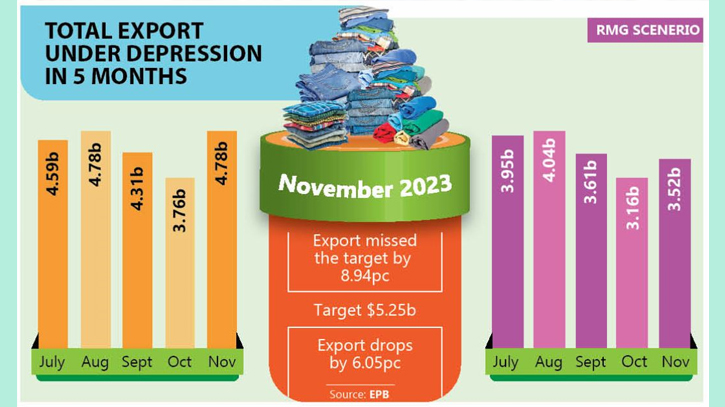
Photo: Messenger
Country’s major foreign currency earner apparel sector experienced a 10.88 percent decline in exports in the last five months of the current fiscal year, which is attributed to global economic inflation and political tension within the country.
In November of the 2023-24 fiscal year, the apparel sector generated $3.52 billion in revenue, marking a 6.05 percent year-on-year decrease in exports, according to the Export Promotion Bureau (EPB).
EPB has reported that Bangladesh's overall exports from July to November of the 2024 fiscal year reached $22.23 billion, showing a modest growth of 1.30 percent.
The individuals concerned are suggesting that exporters should focus on expanding into new markets to mitigate the impact of unforeseen political and economic circumstances.
Faruque Hassan, the President of the Bangladesh Garment Manufacturers and Exporters Association (BGMEA), told The Daily Messenger, “The global market is currently experiencing depressed sales and demand due to historic high inflation and the Russia-Ukraine war.”
In response to a query, he added, “I don't believe any political issues will significantly impact the apparel market in Bangladesh. Bangladesh's infrastructure surpasses that of other apparel makers, making it less susceptible to industry sanctions.”
Exports for the current fiscal year were $4.59 billion in July, $4.78 billion in August, $4.31 billion in September, and $3.52 billion in October. Ready-made garment exports stood at $3.95 billion, $4.04 billion, $3.61 billion, and $3.17 billion, respectively.
However, apparel exports for the same period were $3.95 billion in July, $4.04 billion in August, $3.61 billion in September, and $3.17 billion in October.
During July-November, exports of primary commodities decreased by 5.51 percent, agro-products by 0.86 percent, leather and leather goods by 20.55 percent, jute and jute goods by 10.99 percent, and home textiles by 42.27 percent. Meanwhile, plastic products exports increased by 14.90 percent, and manufacturing products by 1.51 percent.
BGMEA President Faruque Hassan mentioned that inflation in advanced economies has led to increased bank interest rates, limiting consumer purchasing power and demand for goods. The ongoing Israel-Hamas war further exacerbates the crisis.
Analysis suggests that 2023 may not sustain the trade levels of 2022, with a potential decline in apparel trade.
Despite this, recent labour unrest, allegedly sparked by minimum wage issues, has seriously disrupted the industry and exports over the past week. While the minimum wage review is ongoing, violent protests are unfortunate and impact the activities of the wage board.
“Amidst global turbulence, such incidents hinder export growth. We need wholehearted support to restore discipline in the industry and avoid adverse impacts on employment and foreign exchange earnings caused by anarchy,” said Faruque Hassan.
Messenger/Sun Yath








